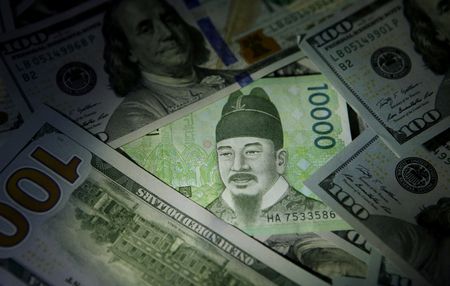By Sameer Manekar
(Reuters) – Bearish positions on most Asian currencies firmed, a Reuters poll showed on Thursday, intensifying steadily from the start of the year as repricing of rate cut bets after strong U.S. economic data pushed the dollar higher.
Short bets on the Malaysian ringgit jumped to their highest level since mid-July last year, while those on the Indonesian rupiah hit an over five-month high, the fortnightly poll of 11 analysts showed.
The Korean won was the most shorted currency by the analysts polled, touching its highest level since October 2022, while bears fortified their positions on Singapore dollar to reach a six-month high.
A slew of strong U.S. economic data and persistent inflation prompted some Federal Reserve officials to temper down market expectations of the quantum of rate cuts this year, strengthening the dollar and casting a shadow over emerging currencies.
“The stronger dollar trend has certainly added to consternation among officials overseas, with the U.S. to some extent exporting its inflation problem to other countries through the dollar,” Michael Wan, senior currency analyst at MUFG wrote.
The Indonesian central bank reassured investors on Wednesday of intervening to help steady the rupiah, which has fallen about 5% so far this year and currently trading at a four-year low. The Bank of Korea also signalled readiness to deal with volatile currency moves.
Analysts at HSBC see the USD-Asia pairs to eventually moderate later in the year, assuming the Fed begins its policy easing cycle, geopolitical risks are manageable, and USD-RMB remains “reasonably contained”.
“The risk is that Asian currencies do not even mildly recover and end up going through yet another year of depreciation, if the Fed does not cut rates after all due to a re-accelerating U.S. economy,” HSBC said in a note.
Meanwhile, short bets on the Chinese yuan ticked higher to reach their highest level since early November, even as the central bank continues to push back against depreciation.
Analysts turned bearish on the top-performing currency in emerging Asia, the Indian rupee, for the first time since mid-December.
“INR weakness is playing catch-up to AXJ (Asia excluding Japan) weakness as a result of exogenous factors, including a revival of high for longer U.S. rates, lingering geopolitical risks in the Middle East, and renewed volatility in yuan and yen,” Christopher Wong, a currency strategist at OCBC said.
However, Wong added that the rupee’s “softness pales in comparison to regional FX” amid “carry allure, bond inclusion and expectations of policy continuity”.
The Asian currency positioning poll is focused on what analysts and fund managers believe are the current market positions in nine Asian emerging market currencies: the Chinese yuan, South Korean won, Singapore dollar, Indonesian rupiah, Taiwan dollar, Indian rupee, Philippine peso, Malaysian ringgit and the Thai baht.
The poll uses estimates of net long or short positions on a scale of minus 3 to plus 3. A score of plus 3 indicates the market is significantly long on U.S. dollars.
The figures include positions held through non-deliverable forwards (NDFs).
The survey findings are provided below (positions in U.S. dollar versus each currency):
DATE USD/CNY USD/KRW USD/SGD USD/IDR USD/TWD USD/INR USD/MYR USD/PHP USD/THB
18-Apr-24 1.25 1.59 0.8 1.32 1.24 0.43 1.42 1.19 1.28
4-Apr-24 1.18 1.09 0.42 1.13 1.17 0 1.15 0.62 1.35
21-Mar-24 0.92 0.82 0.33 0.6 0.92 -0.54 1.12 0.47 1.13
7-Mar-24 0.84 0.54 0.25 0.53 0.64 -0.59 1.14 0.52 1.05
22-Feb-24 0.7 0.4 0.2 0.2 0.7 -0.4 1.3 0.3 1.1
8-Feb-24 0.4 0.39 0.41 0.4 0.32 -0.17 1.07 0.28 0.72
25-Jan-24 0.37 0.9 0.28 0.51 0.49 -0.18 1.21 0.5 0.9
11-Jan-24 0.18 0.3 0.02 0.19 0.05 -0.15 0.72 0.09 0.03
14-Dec-23 0.02 -0.09 -0.22 -0.05 -0.33 0.34 0.58 -0.22 0.16
(Reporting by Sameer Manekar in Bengaluru; Editing by Eileen Soreng)





